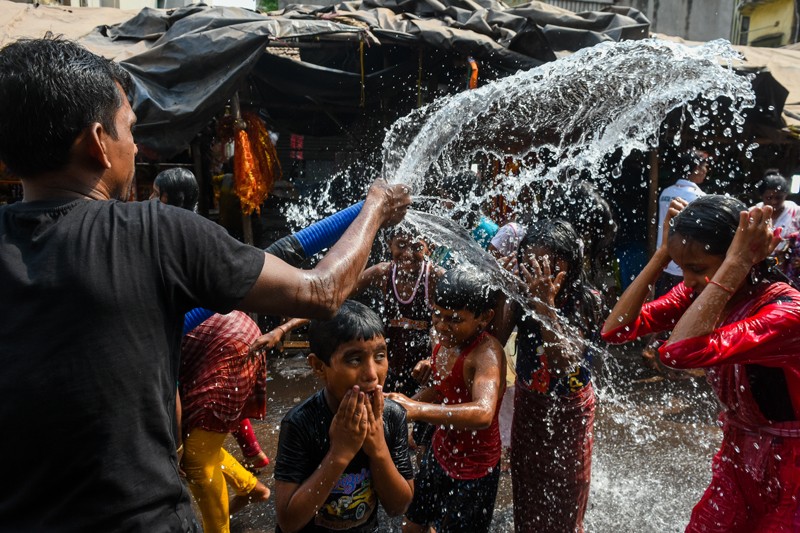The main purpose of this ongoing blog will be to track planetary extreme, or record temperatures related to climate change. Any reports I see of ETs will be listed below the main topic of the day. I’ll refer to extreme or record temperatures as ETs (not extraterrestrials).😉
Main Topic: Attributing India’s Recent Historic Heatwave to Climate Change
Dear Diary. So far in 2022 the worst climate crisis tragedy in terms of lives lost has been a historic heatwave that has burned through India and Pakistan this spring. To highlight the thing, admittedly after the fact for better public consumption, I gave it a name:
Scientific attribution is now taking much shorter time to take place for different big weather events, and in the case of Apalala and other recent heat waves, assigning blame for climate change happened right when the thing ended:
For today’s main subject, here is that Nature article:
- NEWS
- 23 May 2022
Climate change made South Asian heatwave 30 times more likely
Global warming will make record-breaking temperatures in India and Pakistan much more frequent, report finds.

Human-induced climate change made the deadly heatwave that gripped India and Pakistan in March and April 30 times more likely, according to a rapid analysis of the event. Temperatures began rising earlier than usual in March, shattering records and claiming at least 90 lives. The prolonged heat has yet to subside.
“High temperatures are common in India and Pakistan, but what made this unusual was that it started so early and lasted so long,” said co-author Krishna AchutaRao, a climate scientist at the Indian Institute of Technology in New Delhi, in a press release. “We know this will happen more often as temperatures rise and we need to be better prepared for it,” AchutaRao said.
To quantify the role of climate change in the extreme heatwave, a global team of researchers from the World Weather Attribution (WWA) initiative used the average daily maximum temperatures across northwestern India and southeastern Pakistan between March and April to characterize the heatwave. They then compared the possibility of such an event occurring in today’s climate compared with the climate in pre-industrial times, using a combination of climate models and observation data going back to 1979 in Pakistan and 1951 in India.
The team found that climate change increased the probability of the heatwave occurring to once in every 100 years; the odds of such an event would have been once every 3,000 years in pre-industrial times, says Zeke Hausfather, a climate scientist and researcher at Berkeley Earth, a non-profit organization in California that focuses on climate change and analysis of global temperatures. The researchers also show that the event was around 1 ºC warmer than it would have been in a pre-industrial climate.
Climate clincher
“This study is really well done. It follows in the footsteps of a lot of excellent work that the WWA has done,” says Hausfather. “It shows an unambiguous role of climate change in making extreme heat events like this worse.”
In India, March’s temperatures were consistently 3–8 ºC above average, reaching highs of 44 ºC — the highest they’ve been since records began 122 years ago. Pakistan reported temperatures that exceeded 49 ºC in some regions. The heatwave was coupled with below-average rainfall in the region. Pakistan received 62% less rainfall than usual for March, and India 71% less. Although the lack of rain added to heating from the land’s surface, it also reduced the humidity of the heatwave — potentially decreasing health impacts, says Hausfather.
As global warming continues, intense heatwaves will become more common. If the planet stays on track to warm an extra 2 ºC above pre-industrial levels, the report estimates that similar heatwaves would become another 2–20 times more likely than in 2022 — and 0.5–1.5 ºC hotter. The authors add that the short period of observations limits the type of statistical analyses that is possible, and that their results are probably conservative.
Temperature trends
The WWA analysis follows closely on the heels of a study from the UK Met Office, which investigated the chances of temperatures in the region breaking a record set in 2010. It found that the probability increased from once in every 312 years to once in every 3.1 years, owing to climate change. The study estimates that this will increase to once every 1.15 years by the end of the century.
The extreme heat is particularly devastating to people who work outside — such as farmers, construction workers and street vendors. India has also reported a 10–35% decline in crop yields in some parts of the country. Notably, wheat yields dipped low enough to force the country to rescind its plans to boost its wheat exports to bolster supplies affected by the war in Ukraine.
“We had extreme events prior to climate change,” adds Hausfather. “But climate change pushes the bounds of just how bad those weather events can be.”
doi: https://doi.org/10.1038/d41586-022-01444-1
Latest on:
Climate sciences/Climate change:
Amazon Indigenous peoples: lawsuit threatens lands
Sustainable seas: overdue SDG target could be met this year
Australians vote for stronger climate action
Here are some “ET’s” recorded from around the planet the last couple of days, their consequences, and some extreme temperature outlooks:
Here is more climate and weather news from Wednesday:
(As usual, this will be a fluid post in which more information gets added during the day as it crosses my radar, crediting all who have put it on-line. Items will be archived on this site for posterity. In most instances click on the pictures of each tweet to see each article. The most noteworthy items will be listed first.)
(If you like these posts and my work please contribute via the PayPal widget, which has recently been added to this site. Thanks in advance for any support.)
Guy Walton “The Climate Guy”